I am working on 2D rectangular packing. In order to minimize the length of the infinite sheet (Width is constant) by changing the order in which parts are placed. For example, we could place 11 parts in 11! ways.
I could label those parts and save all possible permutations using perms function and run it one by one, but I need a large amount of memory even for 11 parts. I'd like to be able to do it for around 1000 parts.
Luckily, I don't need every possible sequence. I would like to index each permutation to a number. Test a random sequence and then use GA to converge the results to find the optimal sequence.
Therefore, I need a function which gives a specific permutation value when run for any number of times unlike randperm function.
For example, function(5,6) should always return say [1 4 3 2 5 6] for 6 parts. I don't need the sequences in a specific order, but the function should give the same sequence for same index. and also for some other index, the sequence should not be same as this one.
So far, I have used randperm function to generate random sequence for around 2000 iterations and finding a best sequence out of it by comparing length, but this works only for few number of parts. Also using randperm may result in repeated sequence instead of unique sequence.
Here's a picture of what I have done.

I can't save the outputs of randperm because I won't have a searchable function space. I don't want to find the length of the sheet for all sequences. I only need do it for certain sequence identified by certain index determined by genetic algorithm. If I use randperm, I won't have the sequence for all indexes (even though I only need some of them).
For example, take some function, 'y = f(x)', in the range [0,10] say. For each value of x, I get a y. Here y is my sheet length. x is the index of permutation. For any x, I find its sequence (the specific permutation) and then its corresponding sheet length. Based on the results of some random values of x, GA will generate me a new list of x to find a more optimal y.
I need a function that duplicates perms, (I guess perms are following the same order of permutations each time it is run because perms(1:4) will yield same results when run any number of times) without actually storing the values.
Is there a way to write the function? If not, then how do i solve my problem?
Edit (how i approached the problem):
In Genetic Algorithm, you need to crossover parents(permutations), But if you crossover permutations, you will get the numbers repeated. for eg:- crossing over 1 2 3 4 with 3 2 1 4 may result something like 3 2 3 4. Therefore, to avoid repetition, i thought of indexing each parent to a number and then convert the number to binary form and then crossover the binary indices to get a new binary number then convert it back to decimal and find its specific permutation. But then later on, i discovered i could just use ordered crossover of the permutations itself instead of crossing over their indices.
More details on Ordered Crossover could be found here
